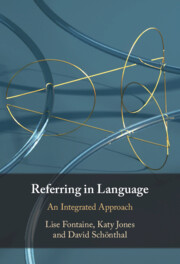Book contents
- Referring in Language
- Referring in Language
- Copyright page
- Contents
- Figures
- Tables
- Acknowledgements
- Part I The Nature of Referring and Referring Expressions
- 1 The Multidisciplinary Field of Referring
- 2 The Great Debate
- 3 A Functional Grammar for Referring Expressions
- Part II Typical Reference
- Part III Atypical Reference
- References
- Index
1 - The Multidisciplinary Field of Referring
from Part I - The Nature of Referring and Referring Expressions
Published online by Cambridge University Press: 22 June 2023
- Referring in Language
- Referring in Language
- Copyright page
- Contents
- Figures
- Tables
- Acknowledgements
- Part I The Nature of Referring and Referring Expressions
- 1 The Multidisciplinary Field of Referring
- 2 The Great Debate
- 3 A Functional Grammar for Referring Expressions
- Part II Typical Reference
- Part III Atypical Reference
- References
- Index
Summary
This chapter introduces the broad and multidisciplinary field of referring and reference, including perspectives from philosophy, psychology, linguistics, and computer science. In this chapter we review some of the key contributions from these disciplines to explain the main background of influences that are still relevant to our understanding of reference and acts of referring. We then discuss traditional approaches to reference from the perspectives of text and discourse, focussing on the concepts of coreference and anaphor, and how these accounts have helped shape but also, to some extent, have limited text-based reference. Contributions from cognitive perspectives, including the role of shared information and the concept of givenness is shown to enrich our understanding of reference. The chapter establishes the reasons why reference must be viewed as addressee orientated, collaborative, and context-dependent. In doing so, we set out the reasons why an integrated approach to reference is needed.
- Type
- Chapter
- Information
- Referring in LanguageAn Integrated Approach, pp. 3 - 22Publisher: Cambridge University PressPrint publication year: 2023

